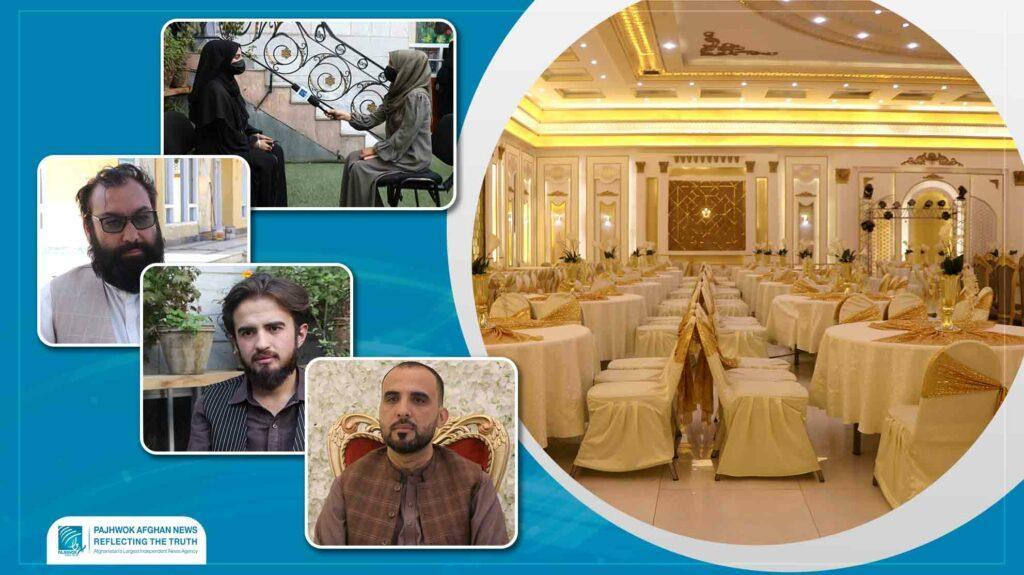
Concerns Rise In Kabul Over Uninvited Wedding Attendees
KABUL (Pajhwok): A number of residents of Kabul are complaining about uninvited guests attending wedding ceremonies in hotels.
Also, experts consider the participation of uninvited individuals in such events as an“improper culture” and suggest that a mechanism should be established to address this issue.
Pajhwok Afghan News has conducted interviews with some residents in the capital Kabul who said during their wedding reception party the number of guests increased to more than twofold of those invited and this made problem for the hosts and the hotel management.
People twice the number of invitees attend the reception, say some families
Roqiya Dalili, a resident of Kot-i-Sangi narrated an unpleasant story of her uncle's wedding held two months ago. She said that over 500 uninvited people attended the reception party at a hotel.
She said:“In fact, we invited 500 people but the number of guests reached 1,000, we invited three to four people by each card but even eight people come and some guests we did not recognize.”
She said:“There was a shortage of food because we prepared food for 700 people then we had to give an order to another hotel for the food.”
She said her uncle is a shopkeeper and it took four years to prepare for his wedding but still he had to borrow money at the end.
Roqiya said:“The hotel owner did not allow the car of the bride and the groom to leave the hotel, they said that you are not allowed to leave the hotel until you make complete payment, we had to borrow money from both our relatives and the bride's relatives and thanks to them for their help.”
She asked the hotel owners, those who work in the hotel service, should not allow uninvited people to enter the hotel.
But it is not alone Roqyia, Mohammad Mustafa, a resident of Kabul City's 6th Police District, said his cousin who is financially unsound had to borrow money to compensate an additional 400 uninvited guests at his wedding reception party.
He had already borrowed money to compensate the 50 percent expenses of his wedding party.
He also demanded a solution to this problem and said that the level of people's awareness in this field should be raised and a system should be created in all hotels to allow entry to the party according to the number of cards and to allow those who do not have cards to enter.
Sayed Ahmad Hairan, director of the Qatrat High School, in this regard said:“Now it is a culture if you invite one person you have to prepare for two more.”
Calling this act wrong and causing disgrace to the groom's family, he added that in one of the gatherings, the number of guests doubled and the bride's family was unable to pay for the hotel due to the poor financial condition.
He said:“The groom's father was forced to take the bride's gold and sell it; because the hotel owner did not allow to leave the hotel without paying our money.”
He asks the families to consider the host's honour and participate in the reception parties according to the number invited and specified on the invitation card.
He asked the officials of the IEA and the hotel management to create a system to solve this problem so that host families do not suffer.
Mechanism needed to address this problem: Experts
Prof. Abdul Ahad Mangal, Head of Folklore and Oral Literature of Afghanistan Academy of Sciences, said:“When someone organizes a wedding reception and invited 400 people this number raised to 800 or 1,000.”
He termed the practice of attending a reception without invitation a wrong culture and said:“Well-off families did not get affected, but someone who is poor would suffer a lot because he invites guests considering his financial strength.”
He said if a mechanism is developed it would be better for example hotels should consider checking invitation cards seriously and individuals who received the cards should be invited.
He said a set of rules should be introduced and guests more than 500 should not be invited to a wedding party.
Mufti Shams-ur-Rahman Farotan, one of the religious scholars, said:“Those who have not been invited to a gathering and they go and participate, and their participation put the owner of the gathering in chaos, face problems, shortage of food and space, the holy religion of Islam decrees that this practice is haram, because it harms a person.”
On the other hand, Khobib Ghafran, the spokesperson for the Ministry of Information and Culture, said:“A sign of high Afghan and Islamic culture is that when a person has not been invited to an event, there is no need to go there, especially at weddings. Each person prepares according to their capacity and considers a specific number of guests. When more people than that attend the event, it causes problems; the host may feel a sense of inadequacy when faced with a shortage of food, which can harm their reputation. Therefore, it is essential for everyone to refrain from attending events where they have not been invited.”
The source adds that efforts are being made to promote this culture, and a public awareness program will be implemented in this regard.
Mohammad Nader Qarghae, head of the Wedding Halls Union, told Pajhwok Afghan News uninvited guests not only caused problems for the host but they put the hotel owners also in trouble because the hotel management is not ready to deal with additional guests and entertain them.
“If 1,000 people come instead of 500 invited people the hotel management was bound to prepare food for them because if even one person goes out of the hotel hungry it would leave a bad impression,” he said.
He said most of the hosts did not specify the number of invited people on the invitation card or most of the guests did not bring the invitation card with them.
He asked people to bring invitation cards with them and reach the hotel on time because some people did not come to the hotel even until 10:00 pm.
nh
Views: 40

Legal Disclaimer:
MENAFN provides the
information “as is” without warranty of any kind. We do not accept
any responsibility or liability for the accuracy, content, images,
videos, licenses, completeness, legality, or reliability of the information
contained in this article. If you have any complaints or copyright
issues related to this article, kindly contact the provider above.


















Comments
No comment